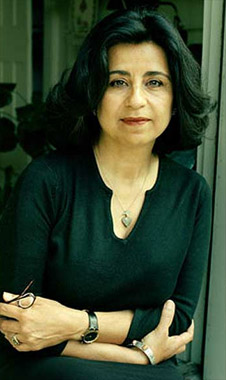
| HOME |
| NERVE |
| REVIEWS |
| ARCHIVE |
| EVENTS |
| LINKS |
| ABOUT US |
| CONTRIBUTORS |
| BACK ISSUES |
| CONTACT US |
The Arab Spring with Ahdaf Soueif
 Award-winning
Egyptian author Ahdaf Soueif discusses the Middle East Revolutions with
Guardian journalist, Bidisha
Award-winning
Egyptian author Ahdaf Soueif discusses the Middle East Revolutions with
Guardian journalist, Bidisha
Wednesday 30th May 2012
Kuumba Imani Millennium Centre
Writing
on the Wall Festival
Reviewed by Pete O’Neill
Cut to scene:
A man in an Internet cafe kneels in a corner, still, waiting solemnly,
absorbed in thought. Suddenly he rises, a voice emanates from him, a call
of "ash-shab yurid isqat an-nizam" (roughly translates: we the
people want to bring down the regime), he is raised upon the shoulders
of a group of around twenty people as they begin to march through town,
the effect is exponential and echoes globally.
This eyewitness account of the events leading to up to what would later be called the ‘Arab Spring’ by Western Media, from acclaimed author Ahdaf Soueif, left the audience with bated breath. The levels of corruption by Mubarak were endemic, in every public place, like shops and bars, there was a picture of the 'Happy Dictator' and a sour joke they used to have described a tourist who would come to town and say 'hey who's that guy in the pictures I see everywhere', to which the reply would be 'oh he's like our silent business partner, he takes the money and does no work'. The population felt helpless and open dissidence could cost them their lives at least.
The system placed many restrictions on quality of life and upon life itself, with other formidable levels of treachery. There were embargoes on goods, curfews on mass populace, severe discrimination and inequality. As a daily occurrence, crimes of both amoral and illegal standards were the norm, innocent lives taken by force, the life of Khaled Said and the Dictatorship's direct involvement in his murder, cover-up attempts, lies and careless attitude to the suffering felt, Adhaf summed this all up with "we were all Khaled Said". An image of Khaled became a signal for change, adding to the groundswell and cause for revolution.
Ahdaf explained in detail many other aspects of her life and about having a dual perspective stemming from being a part-time resident of London to having an "outsiders view" of Cairo. One sign of corruption was the 'plastic Palm Trees lining roads to the airport while at least fifty-thousand street-children suffer'.
A Q&A session led by Bidisha from the Guardian followed, in which the audience eagerly participated. She reflected upon her city and home, and how love and being a woman connects to all this. One poignant question which rounded off the evening was "do you, Ahdaf, think this revolution will result in a healthier future for your home" to which she replied, “Watch this space”.